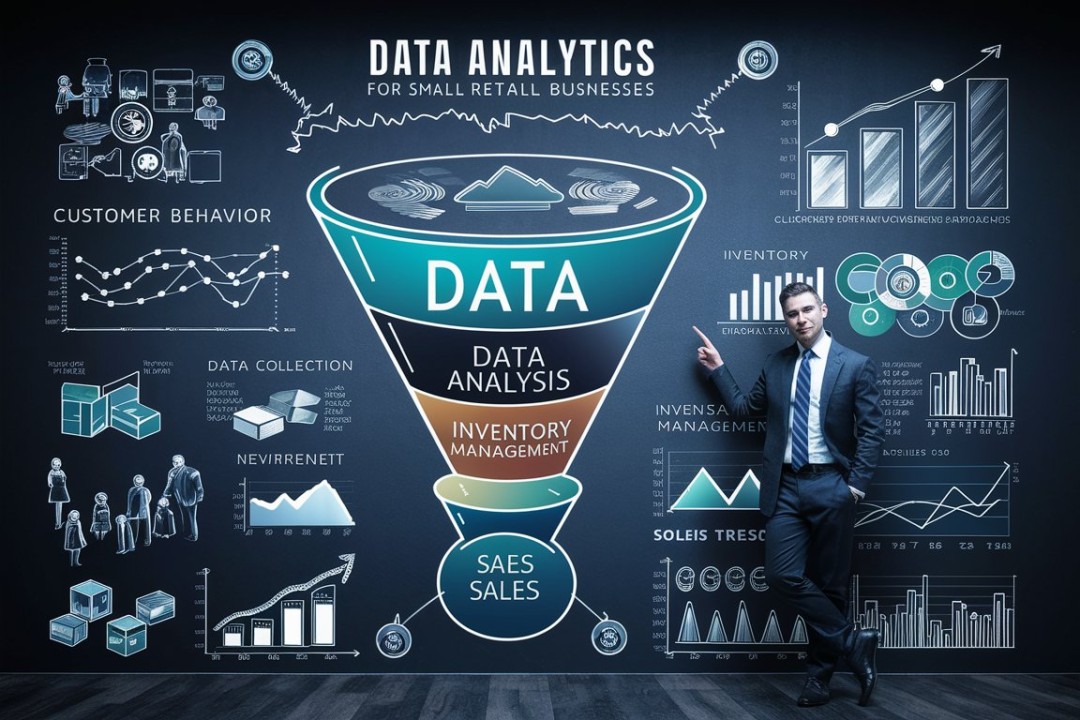
In today’s highly competitive retail landscape, small businesses need every advantage to thrive. Data analytics offers a powerful tool to help these businesses understand their customers, optimize operations and ultimately drive sales. By leveraging data, small retail businesses can make informed marketing and sales decisions, enhancing their ability to meet customer needs and stay ahead of the competition.
The Role of Data Analytics
- Understanding Customer Behavior: Data analytics allows retailers to track and analyze customer behavior, including purchase history, browsing patterns, and preferences. This information can help create personalized marketing campaigns and product recommendations, which significantly enhance the customer experience and increase loyalty (Salesforce) (InstituteData).
- Optimizing Inventory Management: :Effective inventory management is critical for small retailers. Data analytics can forecast demand, reduce stockouts, and prevent overstock situations by analyzing historical sales data and predicting future trends. This ensures that the right products are available at the right time, minimizing costs and maximizing sales opportunities (InstituteData).
- Enhancing Marketing Strategies: By segmenting customers based on various data points, retailers can tailor their marketing efforts to target specific groups more effectively. Personalized promotions and targeted advertising can improve engagement and conversion rates, leading to higher sales. For instance, retailers can use data analytics to determine the best times to send marketing emails or to identify which products are most likely to interest different customer segments (TEKsystems. Let’s own change, together.) (Fit Small Business).
- Making Quick, Data-Driven Decisions: Real-time data analytics enables retailers to make quick decisions based on current market conditions. This agility allows businesses to respond promptly to changes in customer preferences, inventory levels, and other critical factors. For example, if a product is not selling as expected, retailers can quickly adjust pricing or marketing strategies to boost sales (Cloudways).
Practical Applications and Benefits
- Predictive Analytics: By utilizing predictive analytics, small retailers can anticipate future sales trends and customer demands, allowing them to plan more effectively. This helps in optimizing inventory and aligning marketing strategies with predicted market conditions (Salesforce).
- Supply Chain Management: Data analytics can track supply chain performance, helping retailers identify bottlenecks and inefficiencies. This ensures a smoother operation, reduces costs and improves overall efficiency (Cloudways).
- Customer Segmentation and Personalization: Segmenting customers based on their data helps in creating personalized experiences. Tailored recommendations and promotions can significantly enhance customer satisfaction and drive repeat business (InstituteData).
- Sales Optimization: By analyzing sales data, retailers can identify top-performing products and sales channels. This insight allows them to focus efforts where they are most effective, boosting overall sales performance (TEKsystems. Let’s own change, together.).
Key Takeaways
- Leverage Predictive Analytics: Use historical data to forecast future trends and make informed decisions about inventory and marketing.
- Personalize Customer Interactions: Utilize customer data to create personalized marketing campaigns and product recommendations.
- Optimize Inventory Management: Ensure the right products are available at the right times by analyzing sales data and predicting demand.
- Make Data-Driven Decisions: Use real-time data to quickly adapt to market changes and improve operational efficiency.
By integrating data analytics into their operations, small retail businesses can unlock valuable insights, improve customer experiences, and drive sales growth. Embracing data-driven strategies is no longer optional but essential for staying competitive in the ever-evolving retail landscape.
